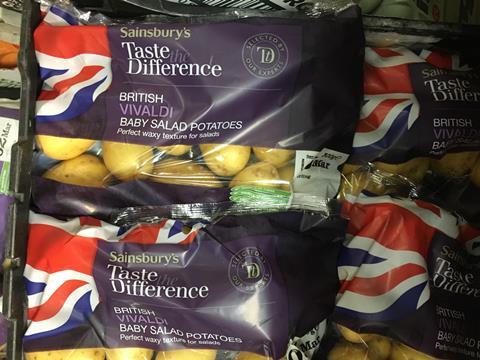
The situation created by the British vote to leave the European Union is momentous for UK food. It is on a par with the Repeal of the Corn Laws of 1846 when Britain decided its Empire could feed it, not its own farmers. And it is as important as the creation of the Agriculture Act of 1947 when after two bruising wars in which the population faced serious risk of starvation, the country decided to put its food house in order – to produce more of what it could and look after the land.
Those events set the tone and framework for UK food for decades after. Brexit will do the same. It doesn’t help that the political elites are now knifing each other in a distraction from the genuine, looming effects.
My concern is that the security of food might get lost in the debacle. The UK must not let that happen. Food stocks are low in a just-in-time economy, an estimated three to five days’ worth. The UK doesn’t feed itself. It has dropped to 61 per cent self-sufficiency, Defra reported last month. The UK has quietly become a “neo-imperialist” food economy, using other people’s land and low wage labour to feed people while consumers subsidise rich landowners and keep their land values high. The UK gets 30 per centof UK food from the EU. That rises to 40 per cent for horticultural produce, of which consumers eat too little for health.
Vulnerabilities
The Brexit vote was always a risk. That’s why we in the Food Research Collaboration, a 500+ network of academics and civil society (www.foodresearch.org.uk), wrote and published reports assessing the food situation in the UK and EU. Our verdict is sober. Brexit looks likely to mean destabilisation just when we need to focus on pressing issues like food’s impact on climate change and obesity. In the short term, a weaker pound means imports cost more. And the UK’s food system is already pretty vulnerable to shock. Chief scientists have been warning as much for years.
In truth, the EU’s leadership on food and agriculture has been timid. We should not forget, however, that there have been important gains from Europe: cleaner water, controls on agrichemicals, tougher food standards. But as the UK cuts loose, a decades-old failure to invest in food skills and equitable infrastructure for sustainable development will be exposed. Are Brexiters ready to go into the picking fields and factories where foreigners work?
Part of the challenge now is the UK’s love of cheap food. This was the legacy of the Repeal of the Corn Laws which sought cheap food for workers. Cheapness as efficiency is still central to the neoliberal project today, as Michael Gove stated in the referendum campaign. But in food, cheapness encourages waste and makes us fat. Good diets are too expensive for the poor.
The UK faces harsh food times ahead, but they have been a long time coming. Diet-related ill-health is very costly. Life expectancy gaps are shocking in an unequal society. The Brexit victors are worryingly vague about what to do next. There was no plan for farming, according to Liz Truss, the Secretary of State at Defra.
My understanding is that some attempts are now underway but Defra is so weakened, we cannot expect much. Some Brexiters want a quick food exit, a total severance of regulations negotiated at Brussels, especially environmental and health ones. Others do not. Some want an end to farm subsidies. Others merely seek their repatriation. It is worth noting here that despite the image of an the EU run by totalitarian eurocrats, how many know there are just 1,000 civil servants running the vast EU Common Agricultural Policy compared to 2,000 civil servants running England’s (let alone Scotland’s or Wales') agriculture?
The referendum debate was dominated by migration, national identity and by the nebulous idea of “taking back control”. But there’s still no clarity from Brexiters about whether the role model is to be Norway, Albania, Canada or Switzerland. Most Brexit leaders aren’t even considering that food arrives on our plates from shops not farms. In fact, food traders rule the modern food economy. Millions of food contracts depend on cross continental supply chains. It’s why roads are clogged with food wagons. The food system is heavily tied into Europe. To sever this web will be a task awesome and unprecedented in complexity.
Risky talks
To make matters worse, the Labour shadow Cabinet Minister on Food, Environment & Rural Affairs, Kerry McCarthy, a decent person interested in her brief, has resigned. This makes it all the more important for forces and views outside Parliament to get our act together and articulate what we think is needed as the country negotiates a new future. Some such meetings are being organised.
Brexit negotiations, if they do happen, must not be an excuse to hand over more wealth to the already wealthy or let only the well-off be well fed. There are already major challenges to the food system as the UK seeks to decarbonise it and shift diets away from overconsumption of ultra-processed foods – the major cause of non-communicable disease.
There is a risk that health and environment are side-lined to the edges of policy reformulation. If the Brexiters hark back to UK self-determination, they need to be reminded that the reality was a mix of Empire-sourcing or panicky direct action in wars, most plainly exposed in 1939. The Brexit euphoria won’t last long if food prices rise or shelves empty. This needs planning. And that’s not what the Brexit elite want. They believe markets rule. But not many of them know what a real food market looks like. They think it’s what happens on brokers’ dealing screens, not what we are able to put on our families' plates.
This article was originally published on The Conversation. Read the original article here.



